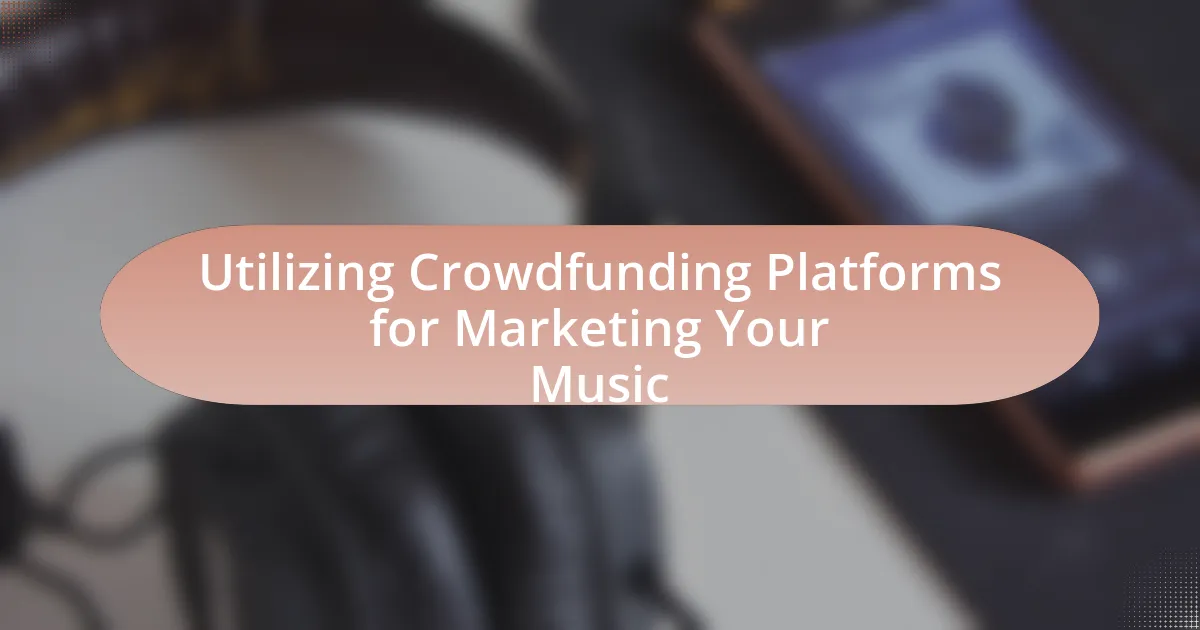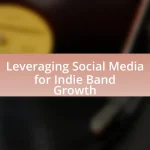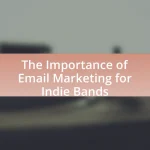Crowdfunding platforms are online services that enable musicians to raise funds for their projects by collecting small contributions from a large number of supporters. This article explores how these platforms, such as Kickstarter and Indiegogo, function within the music industry, detailing various crowdfunding models available to artists, including reward-based and subscription-based crowdfunding. It highlights the advantages of crowdfunding for music marketing, such as enhanced audience engagement and financial benefits, while also addressing the challenges musicians may face, including competition and the importance of effective marketing strategies. Additionally, the article outlines best practices for successful crowdfunding campaigns, emphasizing the significance of storytelling, clear communication, and appealing rewards to attract and maintain backer support.
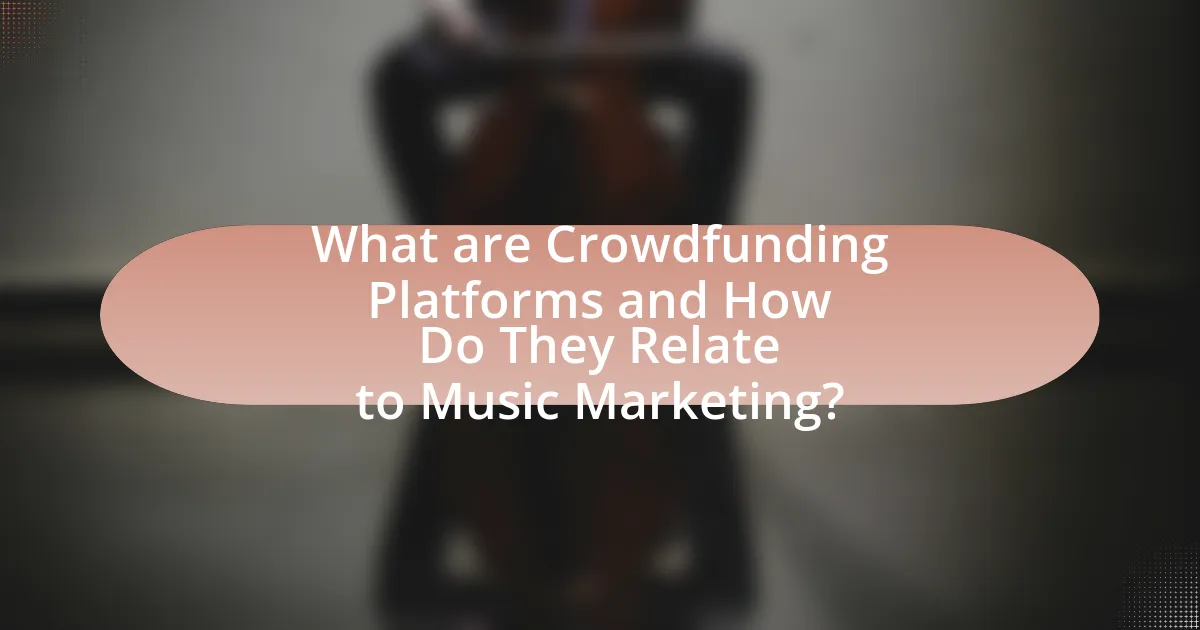
What are Crowdfunding Platforms and How Do They Relate to Music Marketing?
Crowdfunding platforms are online services that allow individuals or groups to raise funds for projects by collecting small contributions from a large number of people. In the context of music marketing, these platforms enable artists to finance their albums, tours, or promotional activities while simultaneously engaging their fan base. For example, platforms like Kickstarter and Indiegogo have been used by musicians to secure funding directly from supporters, creating a sense of community and investment in the artist’s success. This approach not only provides financial backing but also serves as a marketing tool, as successful campaigns often generate buzz and increase visibility for the artist.
How do crowdfunding platforms function in the music industry?
Crowdfunding platforms function in the music industry by allowing artists to raise funds directly from fans and supporters to finance their projects, such as album production, tours, or promotional activities. These platforms, like Kickstarter and Indiegogo, enable musicians to present their ideas and set funding goals, while offering various rewards to backers, such as exclusive content or merchandise. In 2020, over $1 billion was raised through crowdfunding for creative projects, with a significant portion allocated to music, demonstrating the effectiveness of this model in engaging audiences and generating financial support.
What types of crowdfunding models are available for musicians?
Musicians can utilize several crowdfunding models, including reward-based crowdfunding, equity crowdfunding, donation-based crowdfunding, and subscription-based crowdfunding. Reward-based crowdfunding allows musicians to offer incentives, such as exclusive content or merchandise, in exchange for financial support, exemplified by platforms like Kickstarter. Equity crowdfunding enables musicians to sell shares of their project or future earnings, allowing backers to invest in their success, as seen on platforms like SeedInvest. Donation-based crowdfunding relies on supporters contributing without expecting anything in return, often facilitated through platforms like GoFundMe. Lastly, subscription-based crowdfunding allows fans to support musicians through recurring payments for ongoing content, a model popularized by Patreon. Each model provides unique opportunities for musicians to engage with their audience and secure funding for their projects.
How do musicians typically set up campaigns on these platforms?
Musicians typically set up campaigns on crowdfunding platforms by first defining their project goals and funding needs. They create a compelling campaign page that includes engaging visuals, a detailed description of their music project, and specific funding tiers that offer rewards to backers. Successful campaigns often incorporate promotional strategies such as social media outreach, email marketing, and collaboration with influencers to reach a wider audience. According to a study by the University of Southern California, campaigns that effectively communicate their vision and engage with potential backers tend to raise more funds, highlighting the importance of clear messaging and community involvement in the crowdfunding process.
What advantages do crowdfunding platforms provide for music marketing?
Crowdfunding platforms provide significant advantages for music marketing by enabling artists to directly engage with their audience while securing funding for their projects. These platforms facilitate a direct connection between musicians and fans, allowing artists to gauge interest and build a community around their music before release. For instance, successful campaigns on platforms like Kickstarter and Indiegogo have raised millions for music projects, demonstrating the potential for financial support and fan investment. Additionally, crowdfunding campaigns often serve as marketing tools themselves, generating buzz and visibility through social sharing and media coverage, which can lead to increased exposure and future sales.
How can crowdfunding enhance audience engagement for musicians?
Crowdfunding enhances audience engagement for musicians by allowing them to directly involve their fans in the creative process. This involvement fosters a sense of community and investment, as fans contribute financially to projects they care about, leading to increased loyalty and interaction. For instance, a study by the University of Southern California found that musicians who engage their audience through crowdfunding platforms like Kickstarter or Indiegogo often see a 30% increase in fan interaction compared to traditional funding methods. This engagement is further amplified when musicians offer exclusive rewards or experiences, creating a deeper connection between the artist and their supporters.
What financial benefits can musicians gain from successful crowdfunding campaigns?
Musicians can gain significant financial benefits from successful crowdfunding campaigns, including direct funding for projects, increased revenue streams, and enhanced fan engagement. Successful campaigns can raise thousands of dollars, allowing musicians to finance album production, music videos, and tours without relying solely on traditional record labels or loans. For instance, a study by the University of Southern California found that musicians who utilized crowdfunding platforms like Kickstarter raised an average of $7,000 per project, demonstrating the potential for substantial financial support. Additionally, crowdfunding fosters a direct relationship with fans, leading to future sales and merchandise opportunities, which can further enhance a musician’s income.
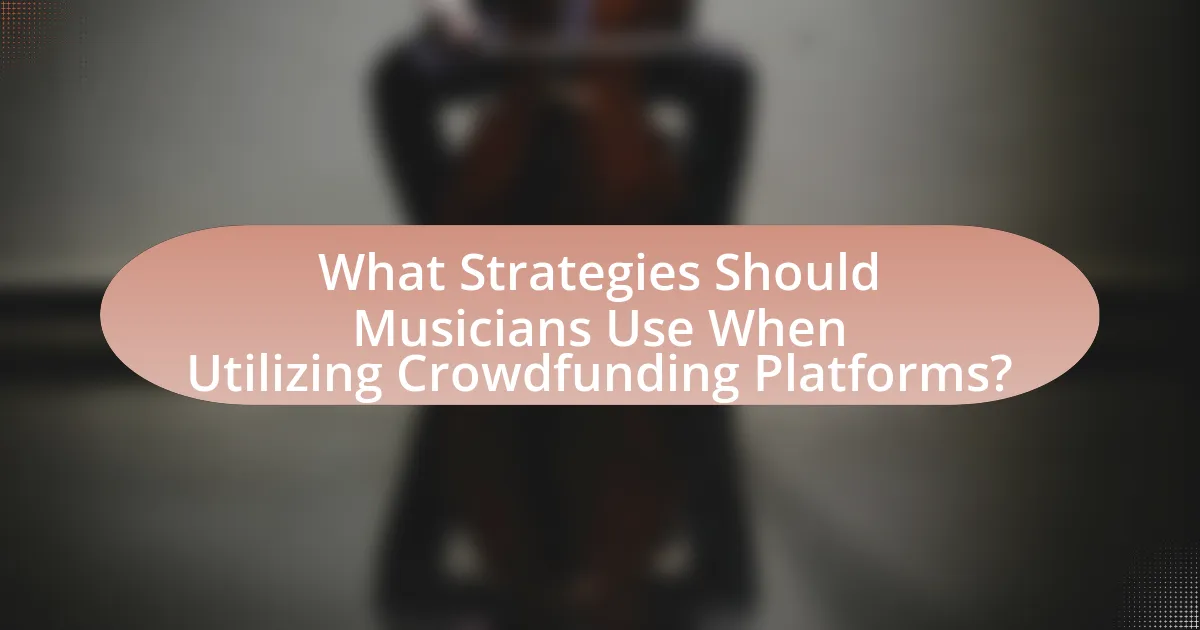
What Strategies Should Musicians Use When Utilizing Crowdfunding Platforms?
Musicians should employ targeted marketing strategies, engaging storytelling, and effective reward structures when utilizing crowdfunding platforms. Targeted marketing involves identifying and reaching out to specific audiences who are likely to support the project, which can increase funding success. Engaging storytelling captures potential backers’ attention by sharing the musician’s journey, vision, and the impact of their work, fostering a personal connection. Effective reward structures incentivize contributions by offering appealing and tiered rewards that resonate with supporters, such as exclusive content or experiences. Research indicates that campaigns with clear narratives and well-defined rewards tend to achieve higher funding rates, demonstrating the importance of these strategies in successful crowdfunding efforts.
How can musicians effectively promote their crowdfunding campaigns?
Musicians can effectively promote their crowdfunding campaigns by leveraging social media platforms, engaging with their fanbase, and creating compelling content. Social media allows musicians to reach a wider audience; for instance, platforms like Instagram and Facebook can be used to share updates, behind-the-scenes content, and personal stories that resonate with potential backers. Engaging with fans through live streams or Q&A sessions fosters a sense of community and encourages support. Additionally, creating high-quality promotional materials, such as videos and graphics that clearly outline the campaign goals and rewards, can significantly enhance visibility and appeal. According to a study by the University of Southern California, campaigns that actively engage their audience and provide regular updates are 50% more likely to reach their funding goals.
What role does social media play in promoting crowdfunding efforts?
Social media plays a crucial role in promoting crowdfunding efforts by providing a platform for creators to reach a wide audience quickly and effectively. It enables artists to share their projects, engage with potential backers, and build a community around their work. According to a study by the University of Pennsylvania, campaigns that actively use social media can raise up to 50% more funds than those that do not, highlighting the significant impact of social media engagement on crowdfunding success.
How can musicians leverage their existing fanbase to boost campaign success?
Musicians can leverage their existing fanbase to boost campaign success by actively engaging them through personalized communication and exclusive content. By utilizing social media platforms, email newsletters, and direct messaging, musicians can inform their fans about upcoming campaigns, creating a sense of urgency and involvement. Research indicates that campaigns with a strong initial backing from existing supporters are 50% more likely to reach their funding goals, as seen in successful crowdfunding projects on platforms like Kickstarter and Indiegogo. This engagement not only fosters loyalty but also encourages fans to share the campaign within their networks, amplifying reach and potential contributions.
What are the key elements of a successful crowdfunding campaign for music?
The key elements of a successful crowdfunding campaign for music include a compelling project narrative, a well-defined target audience, engaging rewards, effective marketing strategies, and a strong social media presence. A compelling project narrative captures the essence of the music and connects emotionally with potential backers, while a well-defined target audience ensures that marketing efforts are directed towards individuals likely to support the project. Engaging rewards, such as exclusive content or experiences, incentivize contributions and enhance backer engagement. Effective marketing strategies, including email campaigns and partnerships with influencers, help to broaden reach and visibility. Finally, a strong social media presence fosters community and encourages sharing, which can significantly increase funding potential. These elements are supported by successful campaigns on platforms like Kickstarter and Indiegogo, where projects that effectively integrate these components often exceed their funding goals.
What types of rewards should musicians offer to backers?
Musicians should offer a variety of rewards to backers, including exclusive content, merchandise, experiences, and recognition. Exclusive content can include early access to new music, behind-the-scenes videos, or personalized songs, which create a sense of intimacy and connection with supporters. Merchandise such as branded apparel, vinyl records, or signed posters provides tangible items that fans can cherish. Experiences like private concerts, meet-and-greet opportunities, or songwriting sessions allow backers to engage directly with the artist, enhancing their investment in the musician’s journey. Recognition can take the form of credits in album liner notes or shout-outs on social media, acknowledging the support of backers and fostering community. These reward types are effective because they cater to different fan interests and create a deeper bond between musicians and their supporters.
How important is campaign storytelling in attracting supporters?
Campaign storytelling is crucial in attracting supporters as it creates an emotional connection and engages potential backers. Effective storytelling allows campaigns to convey their mission, values, and impact, making them relatable and compelling. Research indicates that narratives can increase engagement by up to 300%, demonstrating that well-crafted stories resonate more with audiences than mere facts or figures. This emotional engagement is essential in crowdfunding, where supporters often seek a personal connection to the project or cause they are funding.
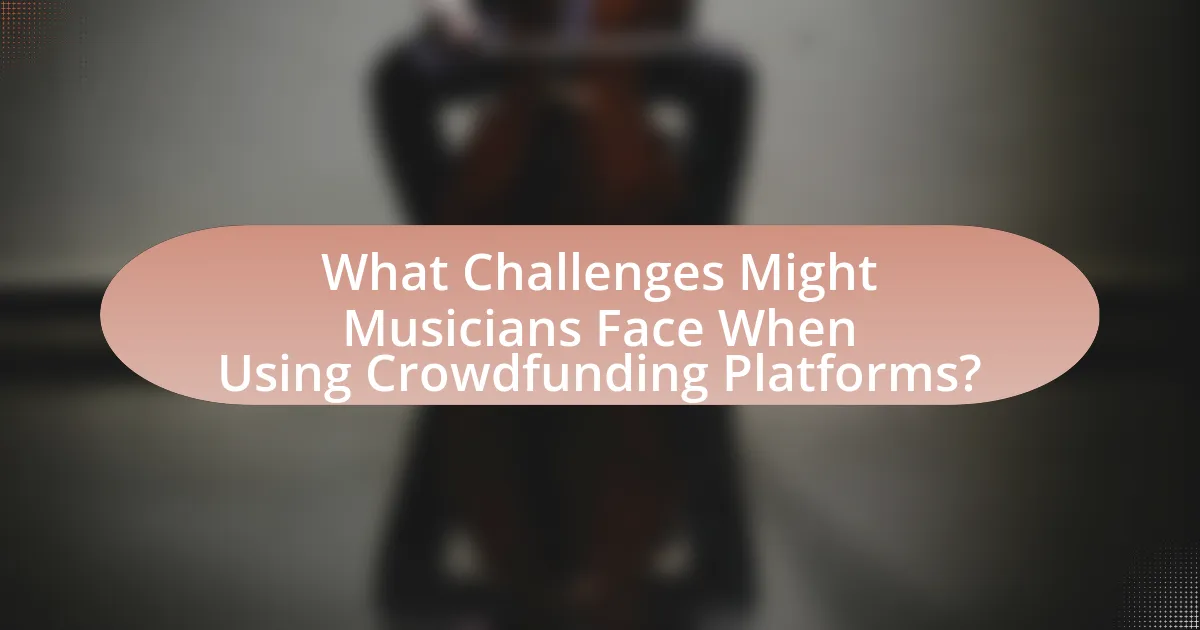
What Challenges Might Musicians Face When Using Crowdfunding Platforms?
Musicians face several challenges when using crowdfunding platforms, including competition for attention, the need for effective marketing strategies, and the risk of not reaching funding goals. The competition is intense, as numerous projects vie for the same pool of potential backers, making it difficult for individual musicians to stand out. Additionally, musicians must develop and implement marketing strategies to promote their campaigns, which can require skills and resources that they may not possess. Furthermore, many crowdfunding platforms operate on an all-or-nothing basis, meaning that if musicians do not meet their funding targets, they receive no financial support, which can lead to wasted effort and disappointment. These challenges highlight the complexities involved in successfully leveraging crowdfunding for music marketing.
What common pitfalls should musicians avoid in crowdfunding campaigns?
Musicians should avoid several common pitfalls in crowdfunding campaigns, including setting unrealistic funding goals. Setting a goal that is too high can deter potential backers, as it may seem unattainable. Additionally, failing to engage with the audience throughout the campaign can lead to a lack of interest and support; consistent updates and communication are crucial for maintaining momentum. Another pitfall is neglecting to offer appealing rewards; backers are more likely to contribute if they see tangible benefits. Lastly, not promoting the campaign effectively across various platforms can limit visibility and reduce potential contributions. According to a study by the University of Pennsylvania, campaigns that actively engage with their audience and offer clear, attractive rewards tend to succeed more often.
How can unrealistic funding goals impact campaign outcomes?
Unrealistic funding goals can significantly hinder campaign outcomes by discouraging potential backers and leading to a lack of trust in the campaign. When funding targets are set too high, they may appear unattainable, causing potential supporters to doubt the project’s viability and ultimately refrain from contributing. Research indicates that campaigns with realistic funding goals are 20% more likely to reach their targets compared to those with overly ambitious goals. This is because achievable goals foster a sense of community and encourage participation, while unrealistic expectations can create a perception of failure, resulting in lower engagement and funding levels.
What are the risks of not delivering on promised rewards?
Not delivering on promised rewards in crowdfunding can lead to significant reputational damage and loss of trust among backers. When creators fail to fulfill their commitments, they risk alienating their supporters, which can result in negative reviews and decreased future funding opportunities. Research indicates that 70% of backers are less likely to support future projects from creators who do not deliver on rewards, highlighting the long-term impact on a creator’s credibility and potential for success. Additionally, legal repercussions may arise if backers feel misled, further complicating the creator’s ability to engage in future crowdfunding efforts.
How can musicians overcome challenges in crowdfunding?
Musicians can overcome challenges in crowdfunding by effectively engaging their audience and creating compelling campaigns. Engaging with fans through social media and email newsletters helps build a loyal community that is more likely to support crowdfunding efforts. Additionally, musicians should set clear, achievable funding goals and offer attractive rewards that resonate with their audience, which can increase the likelihood of reaching their targets. Research indicates that campaigns with well-defined goals and appealing incentives tend to perform better, as seen in a study by the University of Southern California, which found that campaigns with specific funding goals raised 20% more than those without.
What strategies can be implemented to maintain backer trust?
To maintain backer trust, transparency and consistent communication are essential strategies. Providing regular updates on project progress, including challenges faced and milestones achieved, fosters a sense of involvement and accountability. Research indicates that projects with frequent updates are 50% more likely to reach their funding goals, as backers feel more connected and informed about their investment. Additionally, delivering on promises, such as timely rewards and clear timelines, reinforces reliability and builds long-term relationships with backers.
How can musicians adapt their campaigns based on feedback and results?
Musicians can adapt their campaigns based on feedback and results by analyzing data from their crowdfunding efforts and adjusting their strategies accordingly. For instance, if a particular reward tier receives less interest, musicians can modify the offerings or pricing to better align with their audience’s preferences. Additionally, monitoring comments and engagement metrics allows musicians to identify what resonates with their supporters, enabling them to refine their messaging and promotional tactics. Research indicates that campaigns that actively respond to backer feedback can increase funding success by up to 30%, demonstrating the importance of adaptability in marketing strategies.
What Best Practices Should Musicians Follow for Successful Crowdfunding?
Musicians should follow several best practices for successful crowdfunding, including setting clear goals, engaging with their audience, and offering attractive rewards. Clear goals help define the funding target and timeline, which can motivate backers. Engaging with the audience through regular updates and personal messages fosters a sense of community and investment in the project. Offering attractive rewards, such as exclusive content or experiences, incentivizes contributions and enhances backer satisfaction. According to a study by the University of Southern California, campaigns that effectively communicate their goals and engage with supporters are 50% more likely to reach their funding targets.
How can musicians create a compelling campaign video?
Musicians can create a compelling campaign video by focusing on storytelling, high production quality, and clear calls to action. Storytelling engages viewers emotionally, making them more likely to connect with the musician’s vision and support their campaign. High production quality, including good lighting, sound, and editing, enhances the professionalism of the video, which can increase credibility and attract more backers. Clear calls to action guide viewers on how to support the campaign, whether through donations or sharing the video. Research shows that videos with strong narratives and high production values can increase viewer retention and engagement, leading to higher funding success rates on crowdfunding platforms.
What are effective ways to communicate with backers during and after the campaign?
Effective ways to communicate with backers during and after the campaign include regular updates, personalized messages, and engaging content. Regular updates keep backers informed about project progress, fostering transparency and trust; for instance, sending weekly emails or posting updates on the crowdfunding platform can maintain engagement. Personalized messages, such as thanking backers individually or addressing their specific contributions, enhance the sense of community and appreciation. Engaging content, like behind-the-scenes videos or sneak peeks of the project, can sustain interest and excitement. Research indicates that campaigns with consistent communication see a 20% higher retention rate of backers, demonstrating the importance of effective communication strategies.
